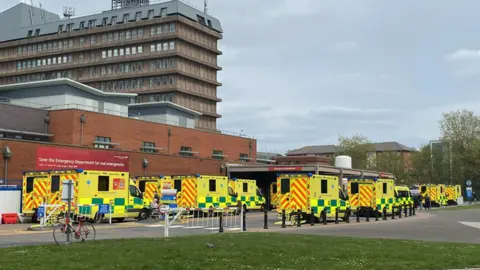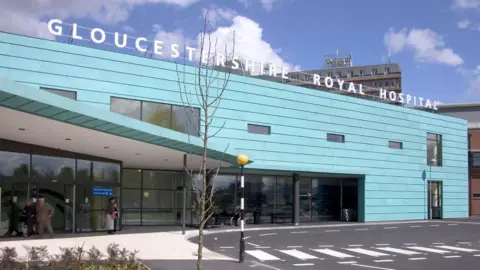'Ambulance delays are a life or death situation'
 BBC
BBCHealth bosses say lives are being put at risk due to delayed ambulance response times to rural parts of Gloucestershire.
It currently takes an average of 20 minutes to respond to life-threatening category one callouts in the Cotswolds and Forest of Dean - the national target is seven minutes.
South Western Ambulance Service said it lost 2,655 hours in December due to slow changeovers and queuing at the county's two main hospitals.
The service says it is working to "eliminate delays".

The delays are reportedly due to a lack of admission space, despite "more than 100 patients" currently taking up beds who are ready to be discharged from hospital, the county council's health overview and scrutiny committee (HOSC) was told in a meeting on 28 January.
Committee chairman Andrew Gravells said ambulances have no choice but to wait in a queue because A&E departments are at capacity.
"We need to see ambulances on the road, answering the calls to 999, not stacking up outside hospitals," he said.
"We were told there were over 100 patients in Gloucestershire Royal who are ready to go home and free up beds. We want to understand why that figure is so high."
Labour MP and vice chair of HOSC, David Drew, said the sheer size of the rural county must be taken into account when discussing pressure on services.
"The simple fact is, there are too many people trying to get through too limited of a service," he said.
"It's a problem locally that's more acute than elsewhere. We can't keep going on this way."
'Like groundhog day'
Councillor Paul Hodgkinson represents some of the worst-affected areas in Gloucestershire - Bourton on the Water and Northleach.
He says in December, category two incidents - which include strokes, overdoses and sepsis patients - took an average of 62 minutes for ambulances to respond, reported the Local Democracy Reporting Service (LDRS).
The national target is 18 minutes.
"These times are very worrying and to be honest with you, this is like Groundhog Day," Mr Hodgkinson said.
"Response times have actually deteriorated to such an extent that I have voiced the fact I am losing patience.
"Until this improves, people will be frustrated and ultimately, this is a life or death situation, our health really depends on this."
Matthew Thomas is the executive medical director at The South Western Ambulance Service NHS Foundation Trust (SWASFT).
Speaking in a recent meeting, he assured the public that work was being done to ensure a "timely handover process" to "eliminate delays".
Local councillors are also trying to arrange a meeting with MPs in an effort to lobby the government to increase A&E capacity.
Follow BBC Gloucestershire on Facebook, X and Instagram. Send your story ideas to us on email or via WhatsApp on 0800 313 4630.
